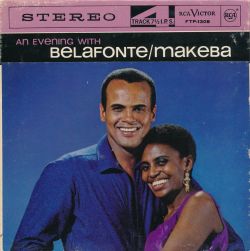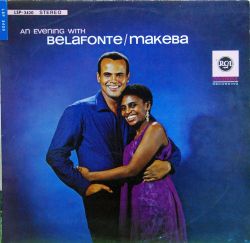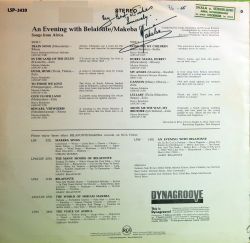|
||||||
|
||||||
| 1 | Train Song (Mbombela)- Xhosa HB/MM | 3:08 |
|
|||
| 2 | In The Land Of The Zulus (Kwazulu)-Zulu MM | 2:30 |
|
|||
| 3 | Hush, Hush (Thula,Thula) -Zulu HB | 3:03 |
|
|||
| 4 | To Those We Love (Nongqongqo) -Xhosa MM | 2:15 |
|
|||
| 5 | Give Us Our Land (Mabayeke) - Zulu HB | 2:27 |
|
|||
| 6 | Ndodemnyama Verwoerd! -Xhosa MM | 2:05 |
|
|||
| 7 | Gone Are My Children (Baile Banake) - Sotho HB | 2:47 |
|
|||
| 8 | Hurry, Mama, Hurry! (Khawuleza) -Xhosa MM | 3:25 |
|
|||
| 9 | My Angel (Malaika) -Swahili HB/MM | 3:12 |
|
|||
| 10 | Cannon (Mbayi, Mbayi) - Zulu MM | 2:47 |
|
|||
| 11 | Lullaby (Thula Sthandwa Same) -Zulu HB | 2:46 |
|
|||
| 12 | Show Me The Way, My Brother (Iph'Indlela) - Zulu HB | 3:10 |
|
|||
| Although
Harry Belafonte had known
Miriam Makeba since 1958, this was the first time he had chosen to
record with her (other than the brief duet on "Just One More Dance" on the
Returns to Carnegie Hall album). Through his efforts as a world ambassador
(both politically as well as musically),
Belafonte acquainted himself with many performers from other countries.
He became a consistent champion of these artists; without him, Americans
would have no doubt never heard of
Makeba,
Nana Mouskouri,
Letta Mbulu, or
Hugh Masekela. This collection of songs from Africa are sung in the
dialects of the Zulu, Xhosa, Sotho, and Swahili peoples. It is too bad that
complete translations are not included in the album, only brief summaries on
the rear liner.
Belafonte writes passionately in the notes (his second) of his
commitment to the South African liberation movement and to the fulfillment
of his association with
Makeba, now South Africa's most revered songstress. Again, only two out
of twelve songs are actually sung by
Belafonte and
Makeba, the rest are solo performances. ~ Cary Ginell, All Music Guide |
||||||
| Other versions of this album: | ||||||
| Victor 740.650 (France) Victor: SHP-5477, RCA-5124 CD: ND89871 |
||||||
Reel to reel tape FTP-1308 |
||||||

